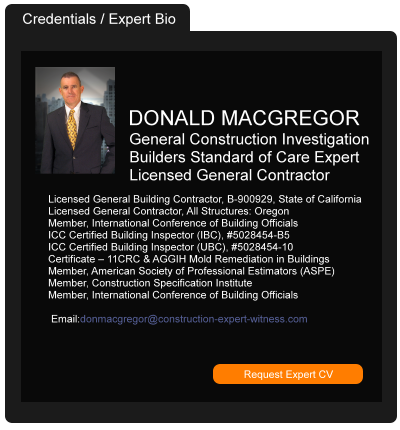Washington Builders Right To Repair Current Law Summary:
Current Law Summary: (SB 5536) The legislature passed a contractor protection bill that reduces contractors' exposure to lawsuits to six years from 12, and gives builders seven "affirmative defenses" to counter defect complaints from homeowners. Claimant must provide notice no later than 45 days before filing action; within 21 days of notice of claim, "construction professional" must serve response; claimant must accept or reject inspection proposal or settlement offer within 30 days; within 14 days following inspection, construction pro must serve written offer to remedy/compromise/settle; claimant can reject all offers; statutes of limitations are tolled until 60 days after period of time during which filing of action is barred under section 3 of the act. This law applies to single-family dwellings and condos.
Building Expert Contractors Licensing
Guidelines Seattle Washington
A license is required for plumbing, and electrical trades. Businesses must register with the Secretary of State.
Association Directory
Local # 4955
335 116th Ave SE
Bellevue, WA 98004
http://www.masterbuildersinfo.com
Seattle Washington Building Expert 10/ 10
Home Builders Association of Kitsap County
Local # 4944
5251 Auto Ctr Way
Bremerton, WA 98312
http://www.kitsaphba.com
Seattle Washington Building Expert 10/ 10
Home Builders Association of Spokane
Local # 4966
5813 E 4th Ave Ste 201
Spokane, WA 99212
http://www.shba.com
Seattle Washington Building Expert 10/ 10
Home Builders Association of North Central
Local # 4957
PO Box 2065
Wenatchee, WA 98801
http://www.nchba.cc
Seattle Washington Building Expert 10/ 10
MBuilders Association of Pierce County
Local # 4977
PO Box 1913 Suite 301
Tacoma, WA 98401
http://www.mbapierce.com
Seattle Washington Building Expert 10/ 10
North Peninsula Builders Association
Local # 4927
PO Box 748
Port Angeles, WA 98362
Seattle Washington Building Expert 10/ 10
Jefferson County Home Builders Association
Local # 4947
PO Box 1399
Port Hadlock, WA 98339
http://www.jeffcohomebuilders.com
Seattle Washington Building Expert 10/ 10
Building Expert News and Information
For Seattle Washington
COVID-19 Business Closure and Continuity Compliance Resource
BE PROACTIVE: Steps to Preserve and Enhance Your Insurance Rights In Light of the Recent Natural Disasters
Why You May Not Want a Mandatory Mediation Clause in Your Construction Contract
IRMI Expert Commentary: Managing Insurance Coverage from Multiple Insurers
10 Answers to Those Nagging Mechanics Lien Questions Keeping You Up at Night. Kind of
Wells Fargo, JPMorgan Vexed by Low Demand for Mortgages
ZLien Startup has Discovered a Billion in Payments for Clients
Lenders and Post-Foreclosure Purchasers Have Standing to Make Construction Defect Claims for After-Discovered Conditions
Georgia Passes Solar CUVA Bill
Eleventh Circuit Finds No Coverage for Faulty Workmanship Claims
Virginia Joins California and Nevada in Passing its Consumer Privacy Act
Should I Stay or Should I Go? The Supreme Court Says “Stay”
Construction Continues To Boom Across The South
Netflix Plans $900M Facility At Former New Jersey Army Base
Hammer & Hand’s Top Ten Predictions for US High Performance Building in 2014
California Appellate Court Confirms: Additional Insureds Are First-Class Citizens
Ahlers & Cressman Presents a Brief History of Liens
Investing in Metaverse Real Estate: Mind the Gap Between Recognized and Realized Potential
Patagonia Will Start Paying for Homeowners' Solar Panels
Landmark Montana Supreme Court Decision Series: Known Loss Doctrine & Interpretation of “Occurrence”
Venue for Suing Public Payment Bond
Brad Pitt’s Foundation Sues New Orleans Architect for Construction Defects
Economist Predicts Housing Starts to Rise in 2014
SCOTUS Opens Up Federal Courts to Land Owners
2024 Construction Law Update
You Cannot Always Contract Your Way Out of a Problem (The Case for Dispute Resolution in Mega and Large Complex Construction Projects)
Micropiles for bad soil: a Tarheel victory
Related’s $1 Billion Los Angeles Project Opens After 15-Year Wait
Lien Law Change in Idaho
Addressing Safety on the Construction Site
New York Appellate Team Obtains Affirmance of Dismissal of Would-Be Labor Law Action Against Municipal Entities
Florida Courts Say that Developers Are Responsible for Flooding
Can a Lease Force a Tenant's Insurer to Defend the Landlord?
Pennsylvania Considers Changes to Construction Code Review
Governmental Action Exclusion Bars Claim for Damage to Insured's Building
Rachel Reynolds Selected as Prime Member of ADTA
Benefits to Insureds Under Property Insurance Policy – Concurrent Cause Doctrine
Construction Litigation Roundup: “The Jury Is Still Out”
Homeowner Survives Motion to Dismiss Depreciation Claims
A Termination for Convenience Is Not a Termination for Default
How Will Artificial Intelligence Impact Construction Litigation?
¡AI Caramba!
New York Court of Appeals Takes Narrow View of Labor Law Provisions in Recent Cases
Replacement of Defective Gym Construction Exceeds Original Cost
U.S. Navy Sailors Sue Tokyo Utility Company Over Radiation Poisoning
Release Language Extended To Successor Entity But Only Covered “Known” Claims
How Long does a Florida Condo Association Have to File a Construction Defect Claim?
Real Estate & Construction News Roundup (1/30/24) – Life Science Construction to Increase, Overall Homeownership Is Majority Female, and Senators Urge Fed Chair to Lower Interest Rates
Recent Environmental Cases: Something in the Water, in the Air and in the Woods
Investigators Explain Focus on Pre-Collapse Cracking in Florida Bridge


































































